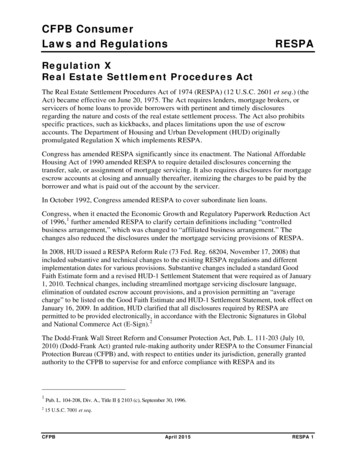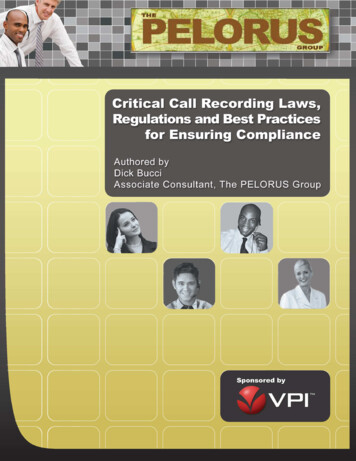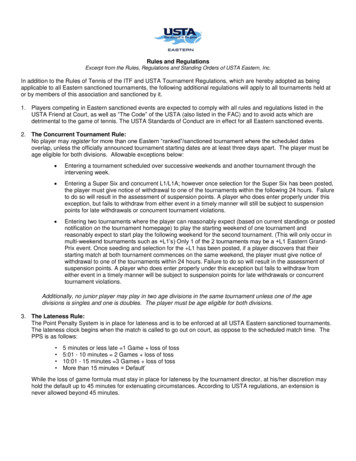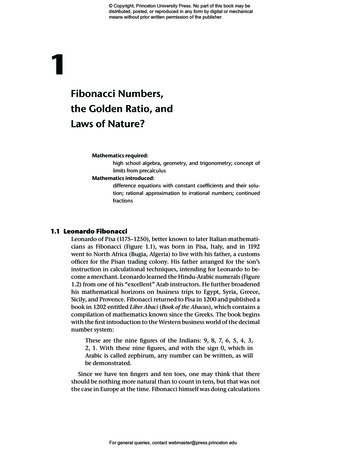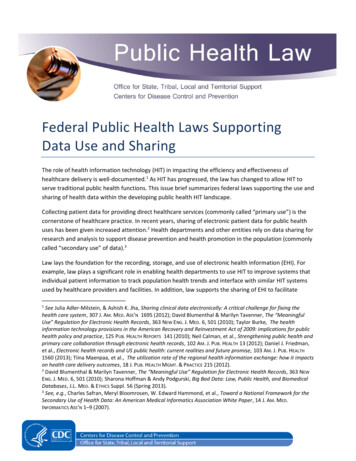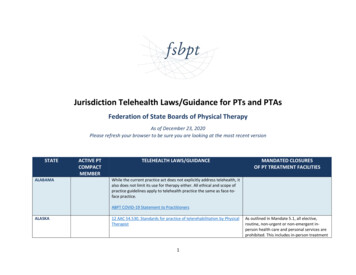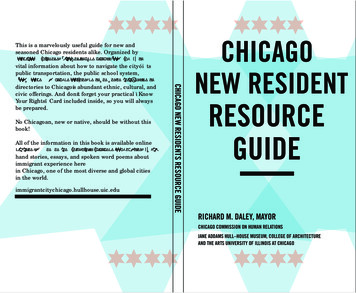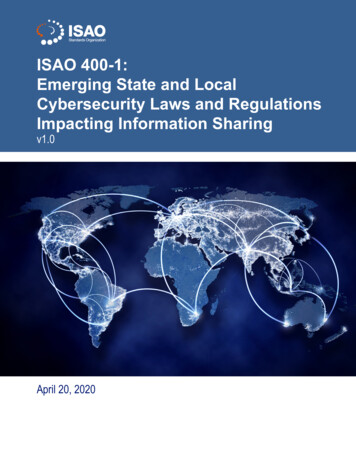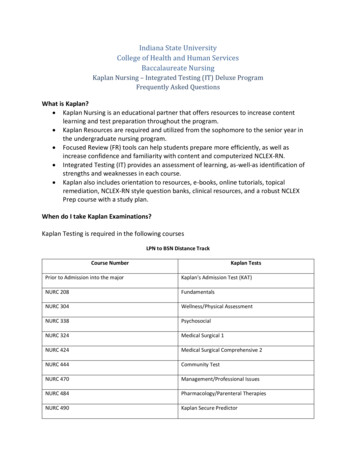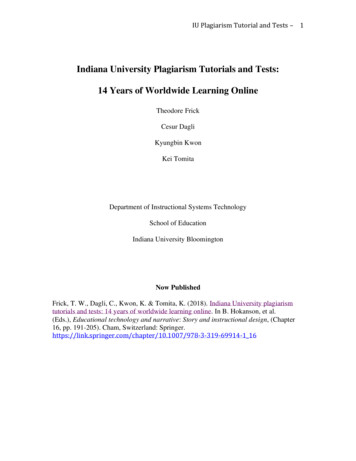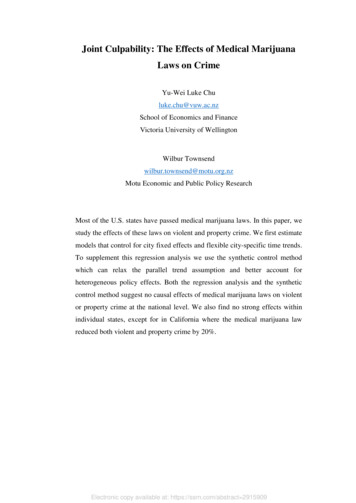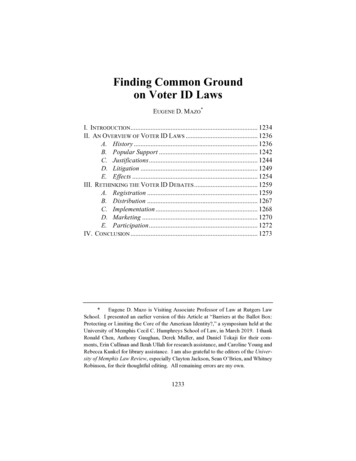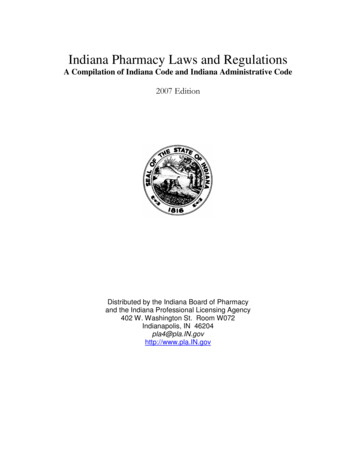
Transcription
Indiana Pharmacy Laws and RegulationsA Compilation of Indiana Code and Indiana Administrative Code2007 EditionDistributed by the Indiana Board of Pharmacyand the Indiana Professional Licensing Agency402 W. Washington St. Room W072Indianapolis, IN 46204pla4@pla.IN.govhttp://www.pla.IN.gov
2
NOTICE: This compilation incorporates the most recent revisions of rule and statutes availableas of July 1, 2007. Note that this compilation is not an official version of the Indiana Code or theIndiana Administrative Code. It is distributed as a general guide to Indiana pharmacy law andregulations. It is not intended to be offered as legal advice, and it may contain typographicalerrors. Neither the Indiana Board of Pharmacy nor its staff are able to provide legal advice onissues contained herein. For legal advice, please consult an attorney. To obtain official copiesof the Indiana Code or Indiana Administrative Code, contact your nearest public library.If you wish to obtain additional copies of this law book, they are available for free on our websitelocated at http://www.pla.IN.gov. Additional hard copies are available for 10.00. Please e-mailpla4@pla.IN.gov for additional information.For questions about federal law and regulations pertaining to drugs and the practice ofpharmacy, contact the nearest office of the U.S. Food and Drug Administration (FDA) or theU.S. Drug Enforcement Administration (DEA).3
4
IndexIC 25-26-13Regulation of Pharmacists and PharmaciesPage 7856 IAC 1Pharmacies and PharmacistsPage 18IC 35-48Controlled SubstancesPage 59858 IAC 2Controlled Substance MonitoringPage 89856 IAC 2Controlled SubstancesPage 91IC 25-1-4Continuing EducationPage 122IC 25-1-9Health Professions Standards of PracticePage 125IC 25-1-12Renewal of Licenses Held by Individuals in Military ServicePage 130IC 25-1-13Indiana Scheduled Prescription Electronic Collection and Tracking ProgramPage 132IC 12-15-35Drug Utilization ReviewPage 133IC 16-42-3Uniform Food, Drug and Cosmetic Act:Chapter 3: Adulteration and Misbranding of Drugs or DevicesPage 141IC 16-42-19Indiana Legend Drug ActPage 146IC 16-42-20Drugs: Enforcement of Pharmacy Laws and RulesPage 151IC 16-42-21Drugs: Drug SamplesPage 155IC 16-42-22Drugs: Generic DrugsPage 156IC 35-43-10Legend Drug DeceptionPage 158IC 25-26-14Wholesale Legend Drug DistributorsPage 159856 IAC 3Wholesale Legend DrugsPage 172IC 25-26-16Drug RegimensPage 176IC 25-26-16.5Drug Regimens in Health FacilitiesPage 178IC 25-26-17Non Resident PharmaciesPage 181IC 25-26-18Mail Order and Internet Based PharmaciesPage 182IC 25-26-19Regulation of Pharmacy TechniciansPage 183IC 25-26-20Regional Central Repository ProgramPage 185IC 25-26-21Home Medical Equipment Services ProvidersPage 187Complete version of IC 25-1-11 Professional Licensing Standards of Practice, may be downloaded from our website athttp://www.pla.IN.gov.5
6
IC 25-26-13Chapter 13. Regulation of Pharmacists and Pharmacies.Creation of BoardIC 25-26-13-1Sec. 1. The practice of pharmacy is declared to be a professional occupation in the state of Indiana, affecting the public health, safety, and welfare andmust be subject to regulation and control in the public interest by the board of pharmacy. It is further declared to be a matter of public interest and concernthat the practice of pharmacy merit and receive the confidence of the public and that only qualified persons be permitted to practice pharmacy in the state ofIndiana.As added by Acts 1977, P.L.276, SEC.1.IC 25-26-13-1.5Sec. 1.5. A right or benefit accrued under IC 25-26-1 through IC 25-26-12 before July 1, 1977, is continued under this chapter.As added by P.L.1-1989, SEC.52.IC 25-26-13-2Sec. 2. As used in this chapter:"Administering" means the direct application of a drug to the body of a person by injection, inhalation, ingestion, or any other means."Board" means the Indiana board of pharmacy."Controlled drugs" are those drugs on schedules I through V of the Federal Controlled Substances Act or on schedules I through V of IC 35-48-2."Counseling" means effective communication between a pharmacist and a patient concerning the contents, drug to drug interactions, route, dosage, form,directions for use, precautions, and effective use of a drug or device to improve the therapeutic outcome of the patient through the effective use of the drugor device."Dispensing" means issuing one (1) or more doses of a drug in a suitable container with appropriate labeling for subsequent administration to or use by apatient."Drug" means:(1) articles or substances recognized in the official United States Pharmacopoeia, official National Formulary, official Homeopathic Pharmacopoeia ofthe United States, or any supplement to any of them;(2) articles or substances intended for use in the diagnosis, cure, mitigation, treatment, or prevention of disease in man or animals;(3) articles other than food intended to affect the structure or any function of the body of man or animals; or(4) articles intended for use as a component of any article specified in subdivisions (1) through (3) and devices."Drug order" means a written order in a hospital or other health care institution for an ultimate user for any drug or device, issued and signed by apractitioner, or an order transmitted by other means of communication from a practitioner, which is immediately reduced to writing by the pharmacist,registered nurse, or other licensed health care practitioner authorized by the hospital or institution. The order shall contain the name and bed number of thepatient; the name and strength or size of the drug or device; unless specified by individual institution policy or guideline, the amount to be dispensed either inquantity or days; adequate directions for the proper use of the drug or device when it is administered to the patient; and the name of the prescriber."Drug regimen review" means the retrospective, concurrent, and prospective review by a pharmacist of a patient's drug related history that includes thefollowing areas:(1) Evaluation of prescriptions or drug orders and patient records for drug allergies, rational therapy contradictions, appropriate dose and route ofadministration, appropriate directions for use, or duplicative therapies.(2) Evaluation of prescriptions or drug orders and patient records for drug-drug, drug-food, drug-disease, and drug-clinical laboratory interactions.(3) Evaluation of prescriptions or drug orders and patient records for adverse drug reactions.(4) Evaluation of prescriptions or drug orders and patient records for proper utilization and optimal therapeutic outcomes."Drug utilization review" means a program designed to measure and assess on a retrospective and prospective basis the proper use of drugs."Device" means an instrument, apparatus, implement, machine, contrivance, implant, in vitro reagent, or other similar or related article including anycomponent part or accessory, which is:(1) recognized in the official United States Pharmacopoeia, official National Formulary, or any supplement to them;(2) intended for use in the diagnosis of disease or other conditions or the cure, mitigation, treatment, or prevention of disease in man or other animals;or(3) intended to affect the structure or any function of the body of man or other animals and which does not achieve any of its principal intendedpurposes through chemical action within or on the body of man or other animals and which is not dependent upon being metabolized for the achievement ofany of its principal intended purposes."Electronic data intermediary" means an entity that provides the infrastructure that connects a computer system or another electronic device used by aprescribing practitioner with a computer system or another electronic device used by a pharmacy to facilitate the secure transmission of:(1) an electronic prescription order;(2) a refill authorization request;(3) a communication; and(4) other patient care information;between a practitioner and a pharmacy."Electronic signature" means an electronic sound, symbol, or process:(1) attached to or logically associated with a record; and7
(2) executed or adopted by a person;with the intent to sign the record."Electronically transmitted" or "electronic transmission" means the transmission of a prescription in electronic form. The term does not include thetransmission of a prescription by facsimile."Investigational or new drug" means any drug which is limited by state or federal law to use under professional supervision of a practitioner authorized bylaw to prescribe or administer such drug."Legend drug" has the meaning set forth in IC 16-18-2-199."License" and "permit" are interchangeable and mean a written certificate from the Indiana board of pharmacy for the practice of pharmacy or theoperation of a pharmacy."Nonprescription drug" means a drug that may be sold without a prescription and that is labeled for use by a patient in accordance with state and federallaws."Person" means any individual, partnership, copartnership, firm, company, corporation, association, joint stock company, trust, estate, or municipality, or alegal representative or agent, unless this chapter expressly provides otherwise."Practitioner" has the meaning set forth in IC 16-42-19-5."Pharmacist" means a person licensed under this chapter."Pharmacist intern" means a person who is:(1) permitted by the board to engage in the practice of pharmacy while under the personal supervision of a pharmacist and who is satisfactorilyprogressing toward meeting the requirements for licensure as a pharmacist;(2) a graduate of an approved college of pharmacy or a graduate who has established educational equivalency by obtaining a Foreign PharmacyGraduate Examination Committee Certificate and who is permitted by the board to obtain practical experience as a requirement for licensure as apharmacist;(3) a qualified applicant awaiting examination for licensure; or(4) an individual participating in a residency or fellowship program."Pharmacy" means any facility, department, or other place where prescriptions are filled or compounded and are sold, dispensed, offered, or displayed forsale and which has as its principal purpose the dispensing of drug and health supplies intended for the general health, welfare, and safety of the public,without placing any other activity on a more important level than the practice of pharmacy."The practice of pharmacy" or "the practice of the profession of pharmacy" means a patient oriented health care profession in which pharmacists interactwith and counsel patients and with other health care professionals concerning drugs and devices used to enhance patients' wellness, prevent illness, andoptimize the outcome of a drug or device, by accepting responsibility for performing or supervising a pharmacist intern or an unlicensed person undersection 18(a)(4) of this chapter to do the following acts, services, and operations:(1) The offering of or performing of those acts, service operations, or transactions incidental to the interpretation, evaluation, and implementation ofprescriptions or drug orders.(2) The compounding, labeling, administering, dispensing, or selling of drugs and devices, including radioactive substances, whether dispensed under apractitioner's prescription or drug order or sold or given directly to the ultimate consumer.(3) The proper and safe storage and distribution of drugs and devices.(4) The maintenance of proper records of the receipt, storage, sale, and dispensing of drugs and devices.(5) Counseling, advising, and educating patients, patients' caregivers, and health care providers and professionals, as necessary, as to the contents,therapeutic values, uses, significant problems, risks, and appropriate manner of use of drugs and devices.(6) Assessing, recording, and reporting events related to the use of drugs or devices.(7) Provision of the professional acts, professional decisions, and professional services necessary to maintain all areas of a patient's pharmacy relatedcare as specifically authorized to a pharmacist under this article."Prescription" means a written order or an order transmitted by other means of communication from a practitioner to or for an ultimate user for any drug ordevice containing:(1) the name and address of the patient;(2) the date of issue;(3) the name and strength or size (if applicable) of the drug or device;(4) the amount to be dispensed (unless indicated by directions and duration of therapy);(5) adequate directions for the proper use of the drug or device by the patient;(6) the name of the practitioner; and(7) if the prescription:(A) is in written form, the signature of the practitioner; or(B) is in electronic form, the electronic signature of the practitioner."Qualifying pharmacist" means the pharmacist who will qualify the pharmacy by being responsible to the board for the legal operations of the pharmacyunder the permit."Record" means all papers, letters, memoranda, notes, prescriptions, drug orders, invoices, statements, patient medication charts or files, computerizedrecords, or other written indicia, documents, or objects which are used in any way in connection with the purchase, sale, or handling of any drug or device."Sale" means every sale and includes:(1) manufacturing, processing, transporting, handling, packaging, or any other production, preparation, or repackaging;(2) exposure, offer, or any other proffer;(3) holding, storing, or any other possession;8
(4) dispensing, giving, delivering, or any other supplying; and(5) applying, administering, or any other using.As added by Acts 1977, P.L.276, SEC.1. Amended by P.L.149-1987, SEC.72; P.L.2-1993, SEC.144; P.L.187-1999, SEC.1; P.L.270-2001, SEC.2; P.L.2882001, SEC.1; P.L.1-2002, SEC.97; P.L.204-2005, SEC.14.IC 25-26-13-3Sec. 3. (a) The Indiana board of pharmacy is created. It shall consist of seven (7) members not more than four (4) of whom may be from the same politicalparty, appointed by the governor for terms of four (4) years. One (1) member of the board, to represent the general public, must be a resident of this statewho has never been associated with pharmacy in any way other than as a consumer. Except for the member representing the general public, the membersmust be pharmacists in good standing of recognized experience and ability from varied practice settings who hold a current license to practice pharmacy inIndiana. One (1) member of the board must be a practicing hospital pharmacist. A person employed as a full-time staff member or as a professor at a schoolof pharmacy may not serve on the board. If a member leaves the board for any reason before the end of the member's term, the member's successor shallserve for the unexpired portion of the term.(b) Not later than ten (10) days after a member's appointment, the member must subscribe by oath or affirmation to faithfully uphold the duties of themember's office. If a member fails to qualify as provided, a new member shall be appointed in the member's place.(c) At the first meeting of each year the board shall elect from among its members a president and vice president who shall perform duties and havepowers as the board prescribes.(d) The board shall meet at least eight (8) times per year at such times and places as the board selects. At each meeting the board shall continue insession from day to day, for not more than five (5) days, until the business of the meeting is complete. Four (4) members of the board shall constitute aquorum.(e) Each member of the board is entitled to compensation as determined by the rules of the budget agency for each day the member is actually engagedin business of the board, together with necessary travel and other expenses incurred in the performance of the member's duties.(f) Approval by a majority of the quorum is required for any action to be taken by the board.As added by Acts 1977, P.L.276, SEC.1. Amended by Acts 1981, P.L.222, SEC.185; P.L.157-1986, SEC.1; P.L.48-1991, SEC.45; P.L.187-1999, SEC.2.IC 25-26-13-4Sec. 4. (a) The board may:(1) promulgate rules and regulations under IC 4-22-2 for implementing and enforcing this chapter;(2) establish requirements and tests to determine the moral, physical, intellectual, educational, scientific, technical, and professional qualifications forapplicants for pharmacists' licenses;(3) refuse to issue, deny, suspend, or revoke a license or permit or place on probation or fine any licensee or permittee under this chapter;(4) regulate the sale of drugs and devices in the state of Indiana;(5) impound, embargo, confiscate, or otherwise prevent from disposition any drugs, medicines, chemicals, poisons, or devices which by inspection aredeemed unfit for use or would be dangerous to the health and welfare of the citizens of the state of Indiana; the board shall follow those embargo proceduresfound in IC 16-42-1-18 through IC 16-42-1-31, and persons may not refuse to permit or otherwise prevent members of the board or their representativesfrom entering such places and making such inspections;(6) prescribe minimum standards with respect to physical characteristics of pharmacies, as may be necessary to the maintenance of professionalsurroundings and to the protection of the safety and welfare of the public;(7) subject to IC 25-1-7, investigate complaints, subpoena witnesses, schedule and conduct hearings on behalf of the public interest on any matterunder the jurisdiction of the board;(8) prescribe the time, place, method, manner, scope, and subjects of licensing examinations which shall be given at least twice annually; and(9) perform such other duties and functions and exercise such other powers as may be necessary to implement and enforce this chapter.(b) The board shall adopt rules under IC 4-22-2 for the following:(1) Establishing standards for the competent practice of pharmacy.(2) Establishing the standards for a pharmacist to counsel individuals regarding the proper use of drugs.(3) Establishing standards and procedures before January 1, 2006, to ensure that a pharmacist:(A) has entered into a contract that accepts the return of expired drugs with; or(B) is subject to a policy that accepts the return of expired drugs of;a wholesaler, manufacturer, or agent of a wholesaler or manufacturer concerning the return by the pharmacist to the wholesaler, the manufacturer, orthe agent of expired legend drugs or controlled drugs. In determining the standards and procedures, the board may not interfere with negotiated termsrelated to cost, expenses, or reimbursement charges contained in contracts between parties, but may consider what is a reasonable quantity of a drug to bepurchased by a pharmacy. The standards and procedures do not apply to vaccines that prevent influenza, medicine used for the treatment of malignanthyperthermia, and other drugs determined by the board to not be subject to a return policy. An agent of a wholesaler or manufacturer must be appointed inwriting and have policies, personnel, and facilities to handle properly returns of expired legend drugs and controlled substances.(c) The board may grant or deny a temporary variance to a rule it has adopted if:(1) the board has adopted rules which set forth the procedures and standards governing the grant or denial of a temporary variance; and(2) the board sets forth in writing the reasons for a grant or denial of a temporary variance.(d) The board shall adopt rules and procedures, in consultation with the medical licensing board, concerning the electronic transmission of prescriptions.The rules adopted under this subsection must address the following:9
(1) Privacy protection for the practitioner and the practitioner's patient.(2) Security of the electronic transmission.(3) A process for approving electronic data intermediaries for the electronic transmission of prescriptions.(4) Use of a practitioner's United States Drug Enforcement Agency registration number.(5) Protection of
7 IC 25-26-13 Chapter 13. Regulation of Pharmacists and Pharmacies. Creation of Board IC 25-26-13-1 Sec. 1. The practice of pharmacy is declared to be a professional occupation in the state of Indi
